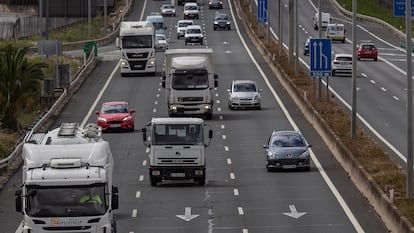Spanish government may allow movement between regions in Phase 3 of coronavirus deescalation plan
Only four islands are currently in this stage, but more than half of Spain could move to this point on June 8, meaning restrictions on travel could be lifted before the end of the state of alarm

Transportation Minister José Luis Ábalos raised the possibility on Monday of allowing movement between provinces and regions that have entered Phase 3 of the government’s deescalation plan. Only the Canary Islands of El Hierro, La Gomera and La Graciosa, and the Balearic Island of Formentera are currently in this stage. But more than half of the country may join the islands on June 8, when the next phase change is scheduled to take place.
According to Ábalos, the restrictions on movement could be relaxed under Phase 3 if the coronavirus outbreak continues to slow, and if the move is supported by the regional governments, which will have control of the final stage of the deescalation process, as Prime Minister Pedro Sánchez announced on Sunday.
Once the state of alarm is over, the restrictions on movement cannot be maintainedTransportation Minister José Luis Ábalos
In an interview with Spanish radio station RTVE, Ábalos explained that “a level of mobility could be established within a region or even between regions that are in the same phase,” in reference to Phase 3. The minister said that the relaxation of the restrictions would “be based on the consideration of the regional authorities” and the “figures on the pandemic.”
The Spanish government secured support on Saturday for a final extension of the state of alarm until June 21. The extraordinary measure, which was implemented mid-March in a bid to halt the spread of the coronavirus epidemic, gives the government the power to prohibit travel between the provinces. But the Madrid region and the metropolitan area of Barcelona are not likely to have entered Phase 3 before the state of alarm comes to an end. Asked about this situation, Ábalos admitted that there will not be “an instrument that allows us to control movement [...] and as such the spread of the virus.” The minister added that the decree to extend the state of alarm involves “greater joint responsibility from the regions.”
“Evidently, once the state of alarm is over, the restrictions on movement cannot be maintained. We hope that when this day arrives, and if the health figures continue to evolve as they are, we hope that this movement will be possible,” he said. “In any case, we have to be vigilant.”
Ábalos’s statement contradicts the secretary of state for communication, who released a guide on the deescalation process on Sunday. This guide indicated that residents will in Phase 3 will “only be able to circulate within their province, island or territorial area.” It added that trips to other parts of Spain will only be allowed for “health, work, professional or business reasons,” to return to a family residence, to care for seniors, dependents or people with disabilities, or for reasons of force majeure. The communication department of the Health Ministry was also unaware of Ábalos’s proposal, reports Emilio de Benito.
The idea of allowing movement between provinces of the same region that are in Phase 3, or even between regions that are in this stage, has the support of Valencian premier Ximo Puig. The premier of Murcia, Fernando López Miras, however, told radio network Cadena SER that what he has most insisted upon in the weekly videoconferences with Prime Minister Pedro Sánchez is the “capacity to limit movement.” Murcia has a very low rate of coronavirus contagions, and regional authorities are concerned the arrival of visitors from other regions, such as Madrid, which has been hardest hit by the epidemic, could lead to a new outbreak in cases.
English version by Melissa Kitson.
Tu suscripción se está usando en otro dispositivo
¿Quieres añadir otro usuario a tu suscripción?
Si continúas leyendo en este dispositivo, no se podrá leer en el otro.
FlechaTu suscripción se está usando en otro dispositivo y solo puedes acceder a EL PAÍS desde un dispositivo a la vez.
Si quieres compartir tu cuenta, cambia tu suscripción a la modalidad Premium, así podrás añadir otro usuario. Cada uno accederá con su propia cuenta de email, lo que os permitirá personalizar vuestra experiencia en EL PAÍS.
¿Tienes una suscripción de empresa? Accede aquí para contratar más cuentas.
En el caso de no saber quién está usando tu cuenta, te recomendamos cambiar tu contraseña aquí.
Si decides continuar compartiendo tu cuenta, este mensaje se mostrará en tu dispositivo y en el de la otra persona que está usando tu cuenta de forma indefinida, afectando a tu experiencia de lectura. Puedes consultar aquí los términos y condiciones de la suscripción digital.









































